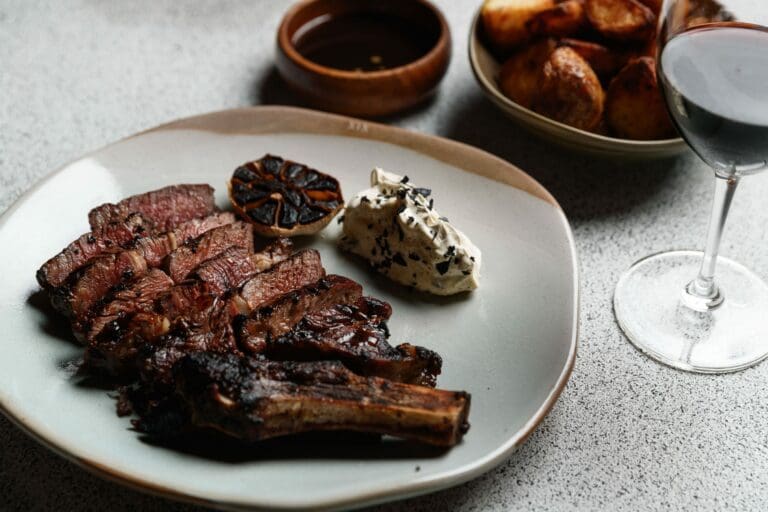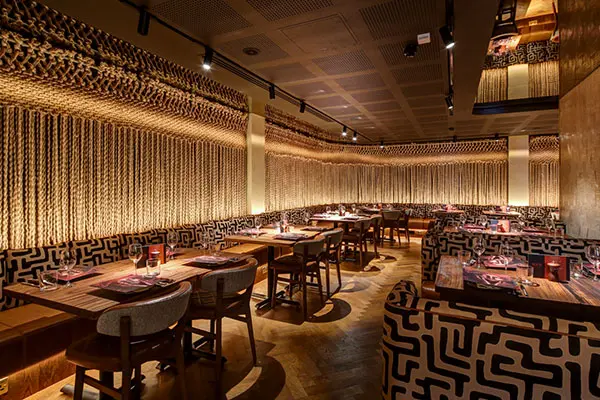
Discover A Fine Dining Halal Lunch Restaurant in London
Discover the finest halal lunch options in London at The Meat & Wine Co. Enjoy premium cuts and an exceptional dining experience.
Discover premium steak and fine wine in the heart of Mayfair at the Meat & Wine Co restaurant. We blend our Australian heritage with African influences to create a fine dining experience tailored just for London, with an extensive menu of steakhouse classics and inventive originals backed with a luxurious wine selection.
With the greatest respect for our produce and the quality of our dining experience, we’re proud to offer a selection of premium cuts of meat, all high grade, ethically-sourced and halal.
At Meat & Wine Co., we’re proud to serve halal steak and other cuts of meat. Sourced from a selection of trusted suppliers, every cut of our premium-grade meat has been treated with the care and compassion of halal tradition. By prioritising high standards in sourcing our produce, we aim to offer an inclusive and memorable experience for every guest. Whilst we are not certified Halal, our menu is free from pork products and thus suitable for those observing halal dietary laws.
Our commitment to ethics and quality extends beyond our own kitchen. To source our signature steaks and other cuts of meat, we work with a hand-picked selection of suppliers in Europe, Australia and the USA, each of which holds the same regard for ethics and halal practices as our team here at Meat & Wine Co.
With such a careful approach to sourcing our produce in the supply chain, we believe you’ll see the difference on the plate. Each of our suppliers shares our commitment to quality, freshness and flavour. Whether you’re sharing a few small plates or indulging in one of our premium steaks, our ethical philosophy and commitment to quality makes us one of the very best restaurants serving halal steak in London.
Our passion for flavour means that we won’t take any shortcuts on our menu. When you dine with us, you’ll find a commitment to freshness, ethically-raised and sourced meat, and premium quality cuts served with skill and care.
Sourced from the best producers in Europe, Australia and the USA, our premium beef is our signature. You’ll find grain and grass-fed beef, raised to produce exceptional flavour and texture, with our favourite cuts taken to another level with our in-house ageing program.
With years of practised skill, our kitchen team delivers premium dishes to suit every taste. Whether you dine on our specialty steaks, hand-selected chicken or lamb dishes, moreish small plates or snacks, you’ll find the same commitment to culinary excellence in every dish. Simply pair with one of our expertly-chosen wines and enjoy.
A short intro here.
Halal is an Arabic term that means “permissible” or “lawful” in Islam. It refers to things that are allowed under Islamic law, particularly in reference to food and drink. When something is halal, it adheres to specific guidelines set by Islamic teachings in the Quran.
Only certain animals are halal and allowed to be consumed. Animals like cows, sheep, goats, camels, chickens, and fish are generally halal.
Haram (which means forbidden) animals include pigs, carnivorous animals (e.g., lions, tigers), birds of prey, and animals that are dead before slaughter.
For meat to be considered halal (permissible under Islamic law), it must meet specific guidelines during its preparation and slaughter. These rules ensure that the meat is processed in a way that adheres to Islamic principles. This includes the type of animal, the preparation of the meat, the wellbeing of the animal, and no contamination with haram substances.
Steak can be halal, but it depends on how the meat is sourced and prepared. For steak to be considered halal, the animal (typically beef) must be slaughtered according to Islamic law, known as Dhabihah. This process includes reciting a prayer (Tasmiyah) and draining the blood from the animal.
Additionally, the steak must not come into contact with haram (forbidden) substances, such as pork or alcohol, during preparation or cooking. At Meat & Wine Co, our steaks are Halal, as they are prepared according to Islamic Law.
A rare steak can be halal as long as the meat comes from a halal source and has been slaughtered according to Islamic guidelines (Dhabihah). The method of cooking, including the doneness level (rare, medium, or well-done), does not affect the halal status of the meat.
Cooking a halal steak follows the same general process as preparing any steak, but with some specific considerations to maintain its halal status. Here’s a step-by-step guide:
Halal Meat: Confirm that the steak is from a halal-certified butcher, ensuring it was slaughtered according to Islamic law (Dhabihah).
Cooking Tools: Make sure any utensils, pans, and grills have not come into contact with non-halal foods, especially pork or alcohol.
Seasoning: Use halal-certified seasonings and marinades. Avoid using alcohol-based ingredients like wine or certain sauces unless they’re halal-certified alternatives.
A restaurant is considered halal when it follows specific guidelines based on Islamic dietary laws (Sharia), ensuring that the food and its preparation comply with these rules. Here are the key factors that make a restaurant halal:
Whilst Meat & Wine Co Mayfair is not currently a certified halal restaurant, all of our steaks are prepared following Halal Guidelines, and we do not serve Pork in any of our restaurants.
Kosher and Halal are dietary guidelines that come from Jewish and Islamic religious traditions, respectively. While both systems outline specific requirements for food preparation and consumption, they differ in certain key aspects. Here’s a breakdown:
Summary:
Both kosher and halal diets focus on the ethical and ritual treatment of animals and purity in food, but they differ in terms of slaughter procedures, permitted animals, alcohol, and the mixing of foods like meat and dairy. Kosher rules tend to be stricter in certain areas (like mixing foods and seafood restrictions), while halal focuses heavily on avoiding alcohol and pork.
We’re proud to introduce our kitchen team. Our ethically-sourced, halal meat is taken to another level by the skill of our chefs, each of whom shares a strong passion for flavour, technique and consistent quality.
Ready to sample our halal menu? Book your table today. We can’t wait for you to join us at our Mayfair restaurant and share our passion for premium-quality cuisine.

Discover the finest halal lunch options in London at The Meat & Wine Co. Enjoy premium cuts and an exceptional dining experience.

Discover the best halal fine dining in London at The Meat & Wine Co. Experience luxury, quality, and exceptional service.

Discover the finest halal steak restaurant in London at The Meat & Wine Co. Enjoy premium cuts and an exceptional dining experience.
| Cookie | Duration | Description |
|---|---|---|
| cookielawinfo-checkbox-analytics | 11 months | This cookie is set by GDPR Cookie Consent plugin. The cookie is used to store the user consent for the cookies in the category "Analytics". |
| cookielawinfo-checkbox-functional | 11 months | The cookie is set by GDPR cookie consent to record the user consent for the cookies in the category "Functional". |
| cookielawinfo-checkbox-necessary | 11 months | This cookie is set by GDPR Cookie Consent plugin. The cookies is used to store the user consent for the cookies in the category "Necessary". |
| cookielawinfo-checkbox-others | 11 months | This cookie is set by GDPR Cookie Consent plugin. The cookie is used to store the user consent for the cookies in the category "Other. |
| cookielawinfo-checkbox-performance | 11 months | This cookie is set by GDPR Cookie Consent plugin. The cookie is used to store the user consent for the cookies in the category "Performance". |
| viewed_cookie_policy | 11 months | The cookie is set by the GDPR Cookie Consent plugin and is used to store whether or not user has consented to the use of cookies. It does not store any personal data. |